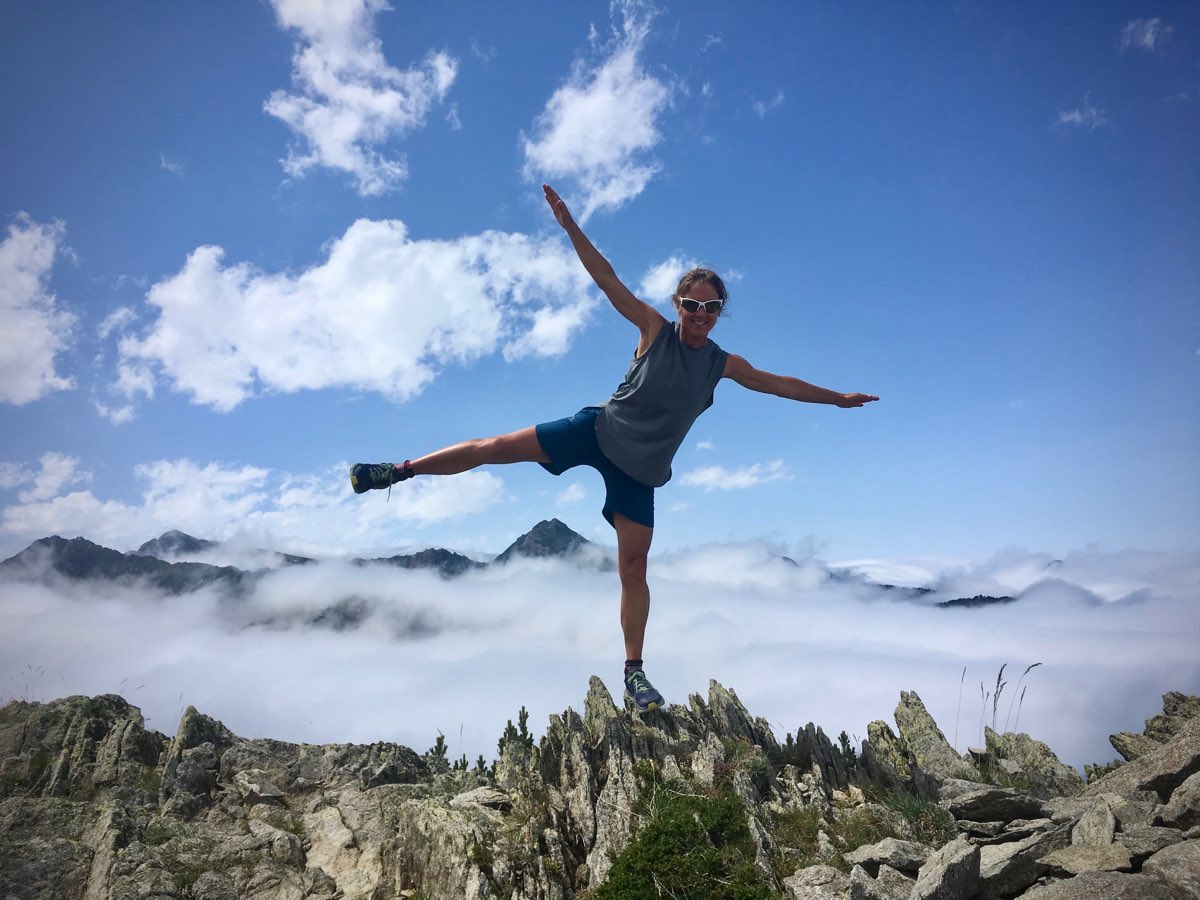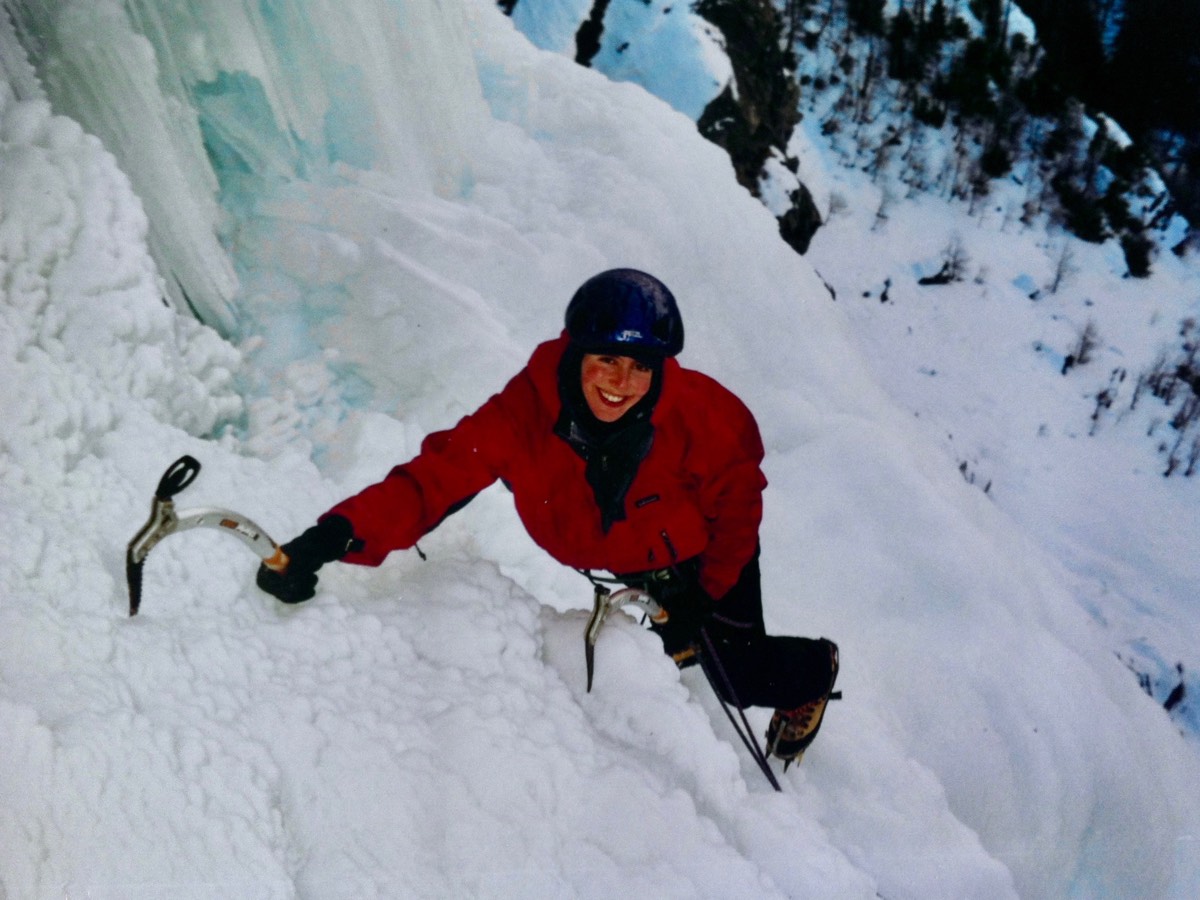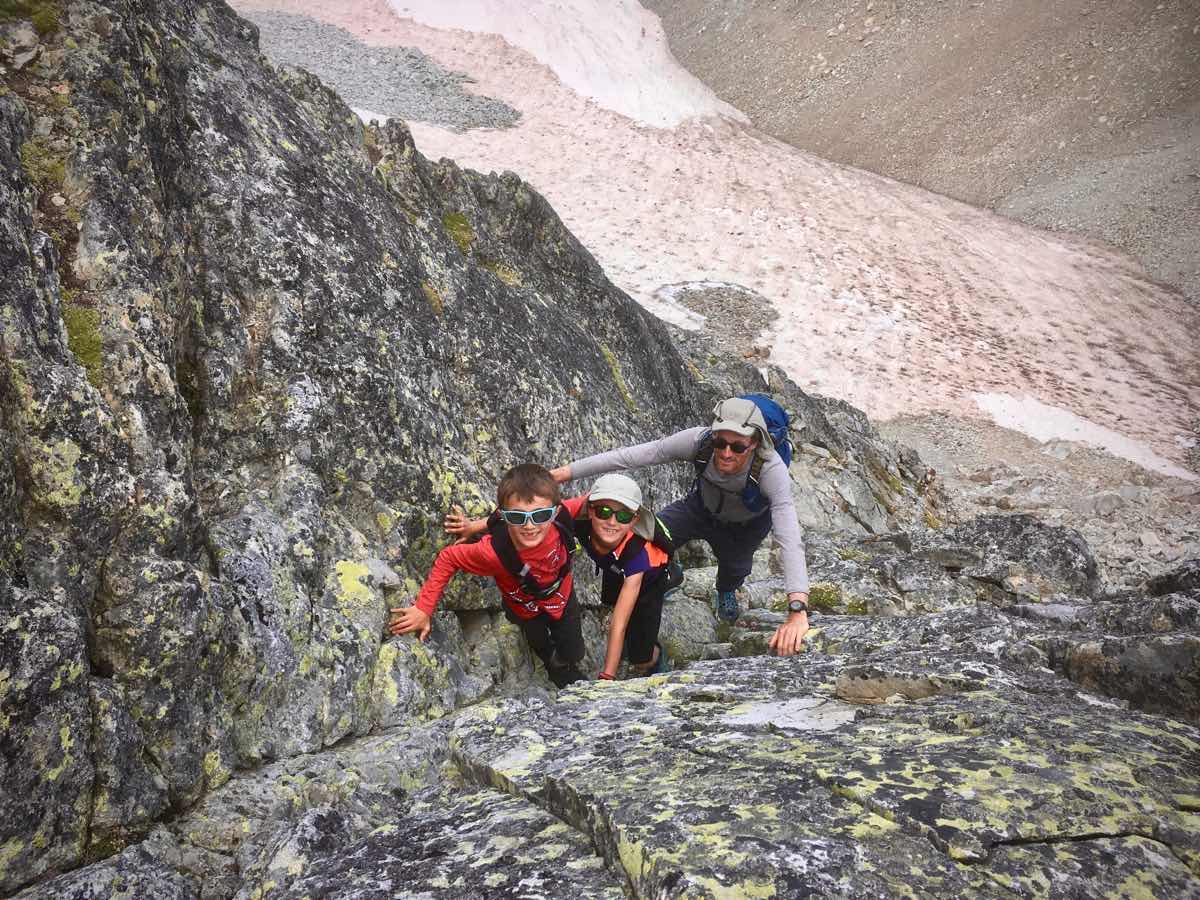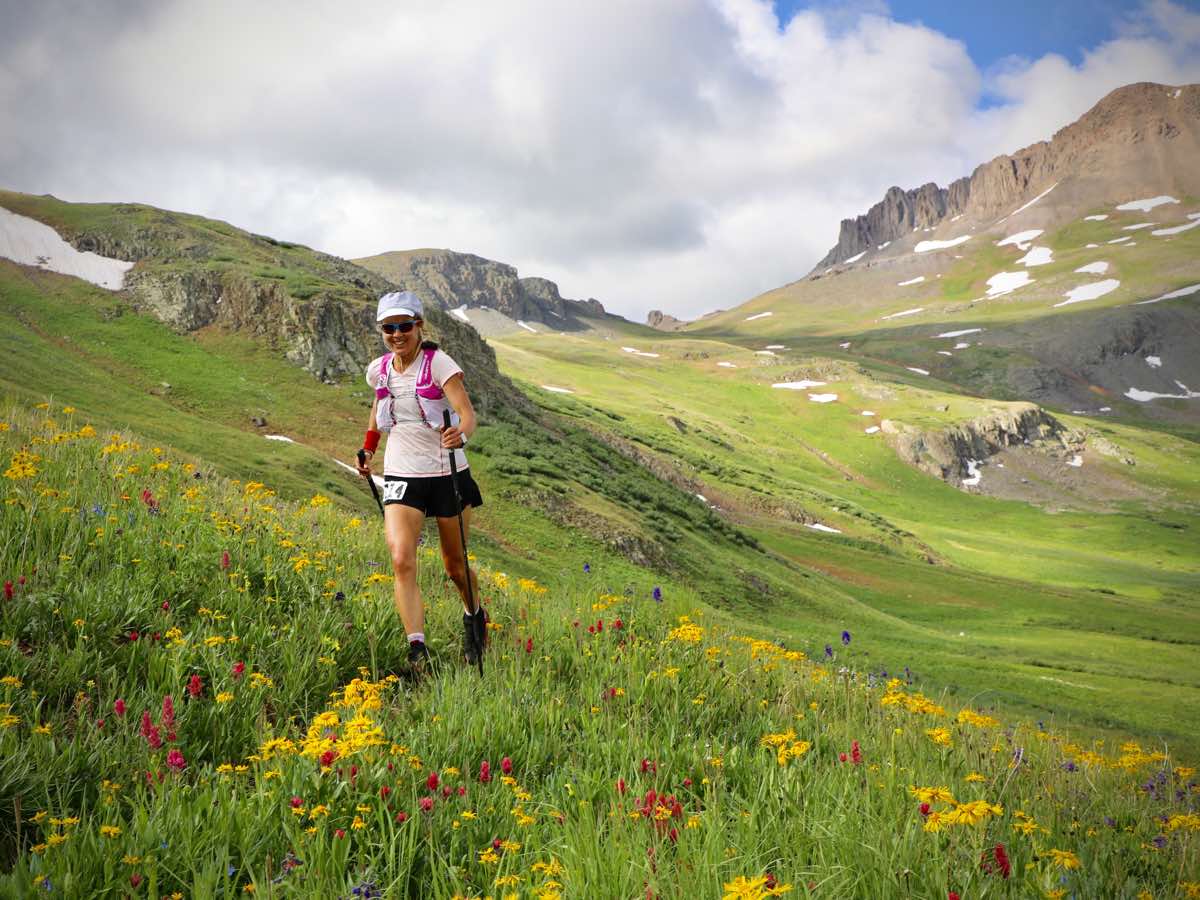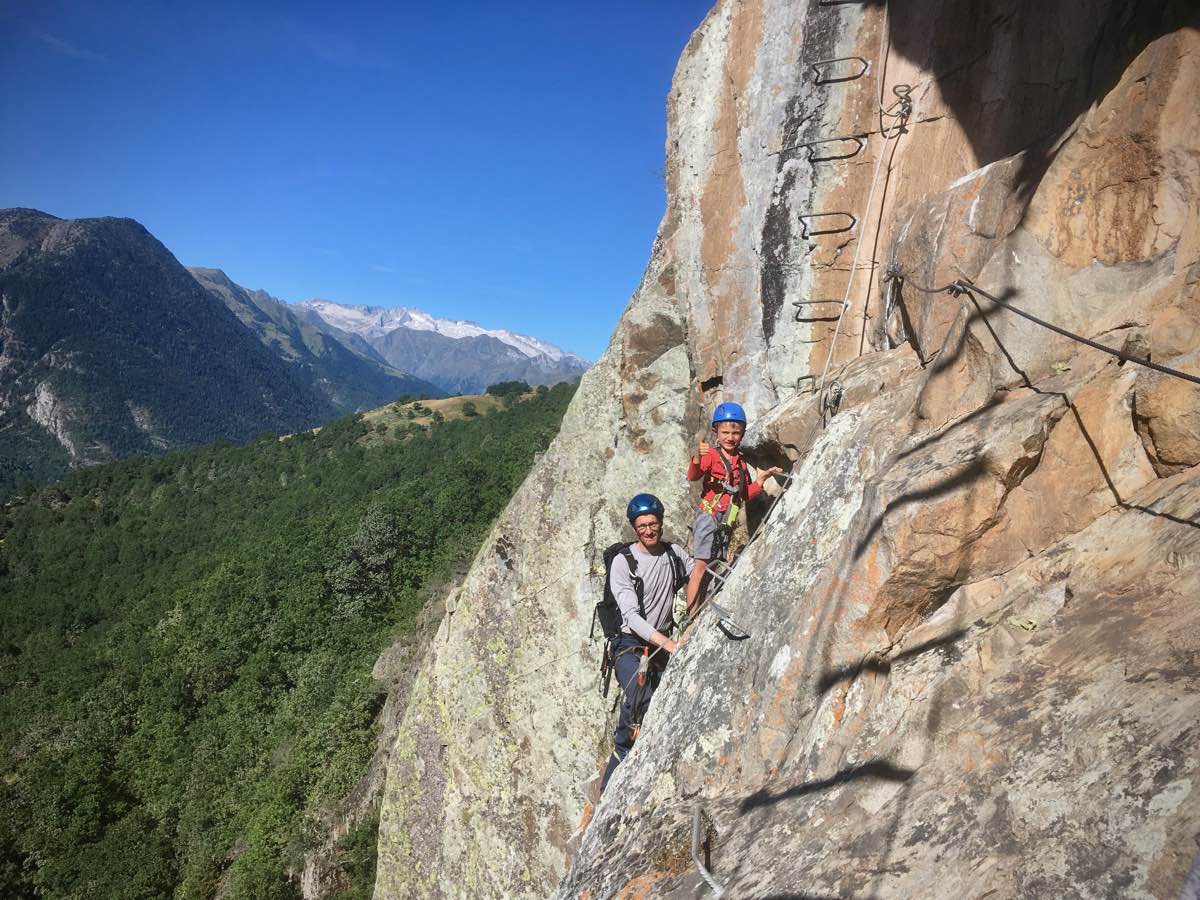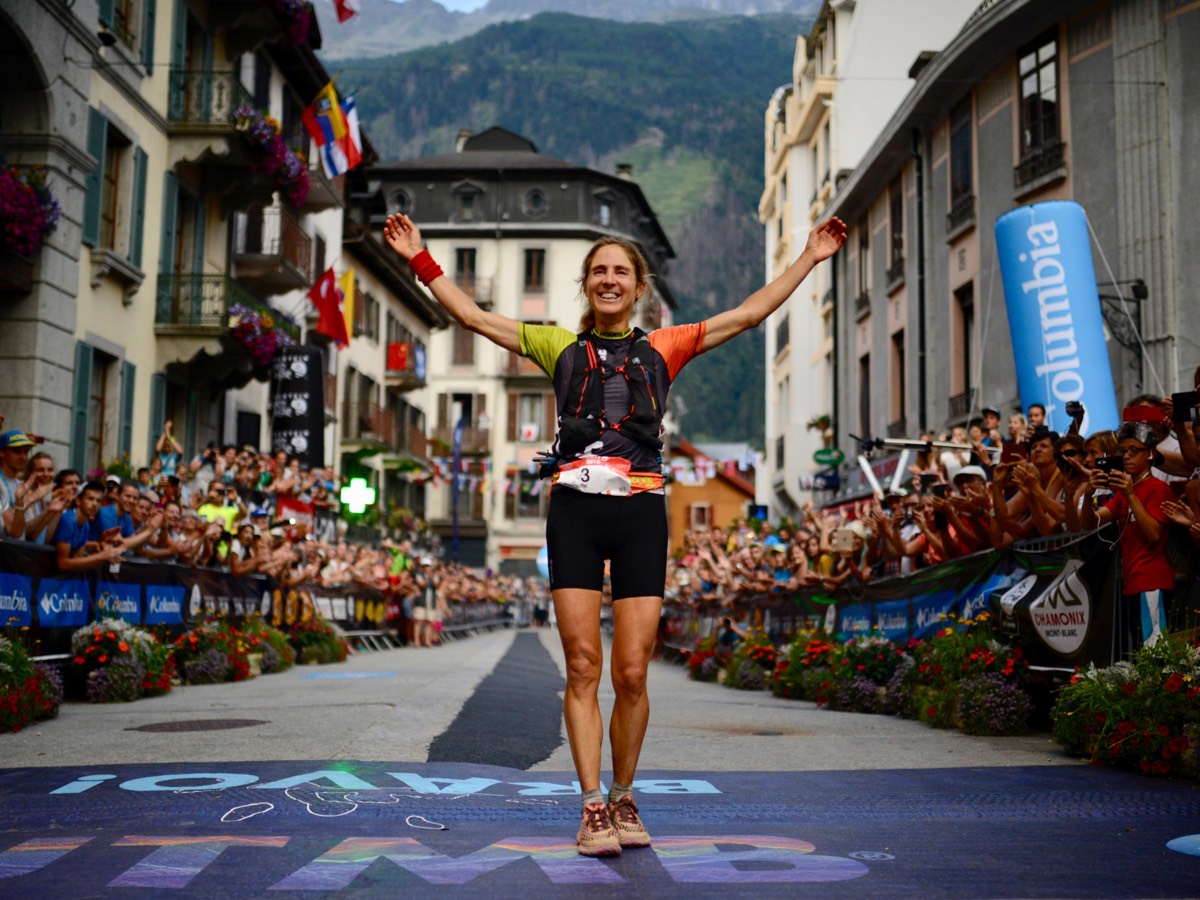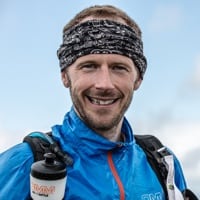The 2016 Trail World Championships in Portugal–that year an 85-kilometer distance–started before the sun was up. Ten kilometers in and representing Great Britain for the first and only time, I knew I was in for a tough race. Runners had disappeared into the darkness ahead of me and I was struggling to find my rhythm. On a benign climb, I heard a runner behind me impersonating the wolf in the three little piggies fable. The loud puffing and panting seemed unsustainable for a race that was going to take all day. Surely they wouldn’t last the race?
In the dark, I glimpsed Caroline Chaverot, competing in the women’s race for France. She would handily win and become the women’s 2016 Trail World Champion.
I should have known, really. We’d crossed paths only two months earlier at the 2016 UTMB in France. Approaching the last climb, I’d caught up with her and she again seemed in some trouble. It looked like a muscle problem this time, cramps I figured. She also looked determined. She became the 2016 UTMB women’s champ, too.
In fact, these are just two examples of a slew of victories Caroline achieved in her 7.5-year career as a trail ultrarunner. For a couple-year window in 2015, 2016, and 2017, she won almost every ultramarathon she entered. Yet this summer, the 43-year-old teacher and mother of three announced her retirement from the sport.
Born in Geneva, Switzerland, along with two older siblings and typical of many ultrarunners, Caroline grew up with outdoorsy parents. “My parents were not really into sport, but we had a small holiday home in the mountains, in the middle of nowhere, and spent lots of time there. We hiked in the summer and skied in the winter.”
At age 12, though, sport began to feature at the forefront of Caroline’s life. First it was kayaking. She competed in three world championships (one as a junior) for Switzerland and just missed out on qualifying for the 1996 Olympics in Atlanta, Georgia. She says, “It’s a sport where you need a lot of power in the arms–it’s very explosive. A competition lasts for about two minutes. I decided to stop.” That was at age 22.
After moving to France and studying to become a teacher, Caroline started sport climbing and met her husband-to-be Luc at 25 years of age. “I was already climbing when we met at a sport-climbing cliff in 2003. Soon we were climbing two to three times a week and every weekend we traveled to climb more. It was just for fun, but we were training a lot, to be able to climb hard routes outside.”
Over time, her passion for climbing dwindled some, but it was next replaced by road cycling and mountain biking. After that, the Caroline and Luc’s desire to raise a family limited her time for sports. Eve, their oldest child and only daughter, came first, then sons Tom and Noé. Their youngest, Noé, was born in 2011. “For five years I did almost no sport. I really wanted to spend my energy outside, but when you have three kids you can’t go mountain biking all day. I was looking for a sport that wasn’t as demanding of my time, so I started to run. I thought, Okay, it’s a good sport–in one hour you are tired and happy. Every time I ran I was happy.”
In the spring of 2012, she entered a local trail race. “I liked it. So I did more.” That fall, she tried her first ultramarathon, the 52k Trail Des Aiguilles Rouges in France with its loads of climbing. “It took me 8.5 hours. It was very hard, but good fun. [She placed fourth.] I said, ‘Okay, I will train more and do some other races.’ But I never thought I would win a big race. It was just for fun.”
As you can tell by how much she invested in other sports before running, when Caroline likes a sport, she really gets into it. “I think it’s my character, you know? I don’t like to practice an activity just for fun. I need something more. I need to try to improve my technique. For example, my daughter is competing in cross-country skiing now. I know I will never be a champion at that, but I like to study the technique–to improve, to do well, to practice.”
In 2013 Caroline did very well, indeed. She ran eight trail ultras, including the Mont-Blanc 80k, Les Templiers, and CCC. Of those eight ultras, she won seven. She says that the CCC was the highlight. “The elite runners were very professional, with lots of assistance. I had none. I didn’t study the course. The day before I was working until 5 p.m.. I got to Chamonix at the last minute, collected my bib, and slept in the car. I hadn’t thought about what I would eat in the race. I thought I could just use the assistance points. I didn’t realize they were so far apart, so I was a bit hungry!”
Then her headlamp died a kilometer from the finish and she fell. “I had to fight with a Spanish girl until the end. I didn’t expect to win and the crowd in Chamonix… It was a fantastic moment for me.”
Caroline’s early results are all the more impressive because, as well as mothering three children, she was working full-time as a teacher. “I was still breastfeeding my third child, and with three young kids, I couldn’t leave them for more than two hours at a time. During the week I was working, too, but I had time to train on my [two-hour] lunch break. I was motivated and at every race I learned a lot. I got more experience and became more resistant.”
Her success in trail ultras surprised her,” I never sensed I was a strong runner. But whenever I started a race, I felt good and it went well–it was sort of easy. In the training I was not that strong or fast, if I compare myself to other athletes. For the 2016 Trail World Championships, I trained with Andrea Huser. She was much faster than me in training; there was no comparison. But in the race I was faster. I considered Ruth Croft to be way better than me, but I would [later] beat her [at the 2017 Lavaredo Ultra Trail]. ”
She recorded more wins in 2014, perhaps the most influential one in the French Long Distance National Trail Championships at the Trail Drôme. This led her to represent France at the 2015 Trail World Championships where she took second and helped the French women’s team earn a gold medal.
“It was always a bit difficult. I was not jealous, but [back then] other athletes like Emelie Forsberg were just training and having fun in the mountains and I was stuck in my job and with the family. I didn’t want to leave my family every Saturday to train because I liked spending time with them. For me it was family first, then training, but [there was] never time for me.”
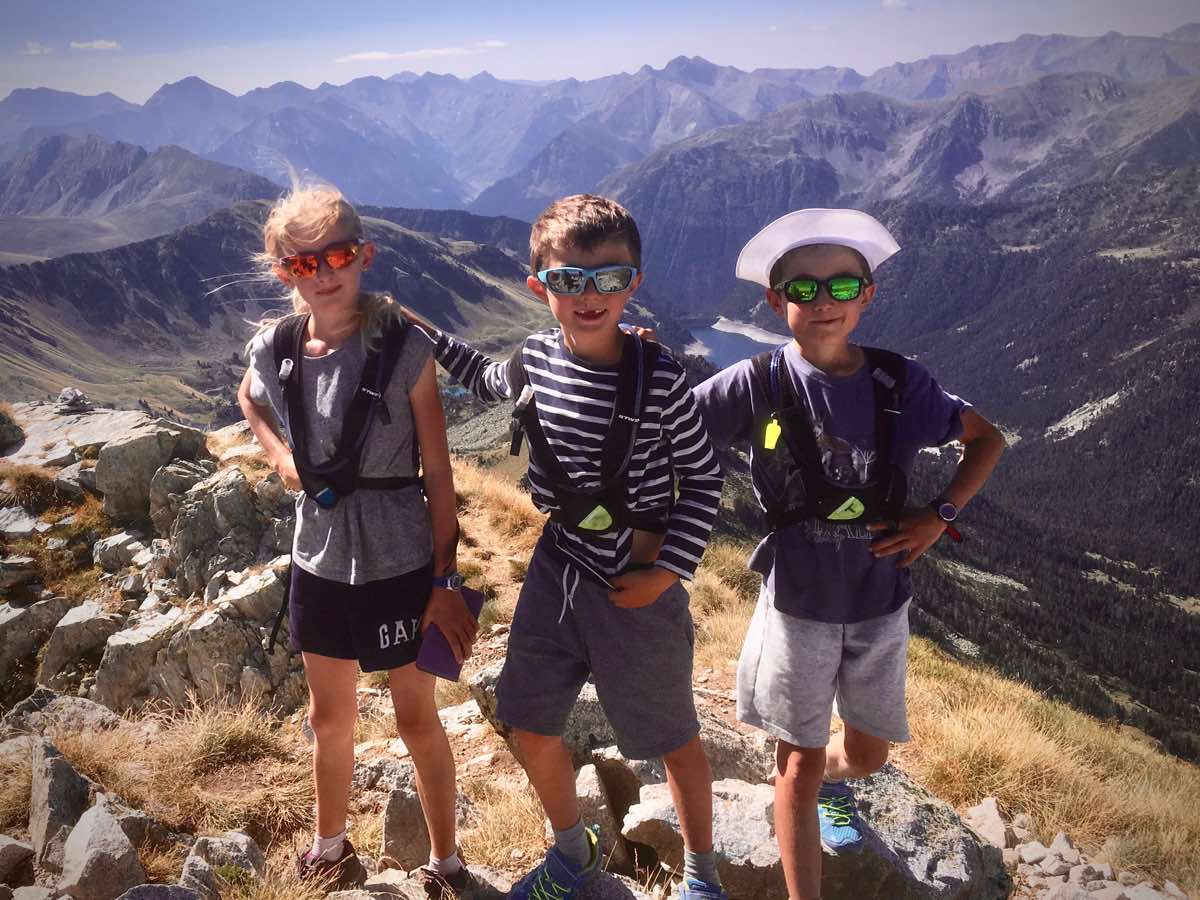
Caroline’s three kids from left to right are Eve, Noé, and Tom. Photo courtesy of Caroline Chaverot.
Tellingly–and understandably–she admits to sometimes feeling significantly tired. “In 2015 I had a fantastic start to the season, but suddenly I was tired before UTMB and I couldn’t finish it. Sometimes it was difficult to cope with [training, work, and family]. In French, we talk of ‘the mental weight’ and I was never completely free, always with an eye on my watch when running, because I had to be back for my job or to pick up my kids. I realize it more now that I’ve stopped competing. I continue to train but I feel more relaxed.”
Caroline figured that if she wanted to win UTMB, she should do more long runs, so her parents were recruited for childcare. “Some weekends I would go with my husband and do a lot of running or cycling or both, so I could train a bit more, and longer.”
Her increased commitment to training led to a 2016 that was off the performance charts: she raced 12 ultras and won 11 of them, including the aforementioned victories at UTMB and the Trail World Championships. “The Trail World Championships were extraordinary. It was not exactly my type of race. It was fast, quite runnable, and there were some strong athletes, but for me a big highlight.”
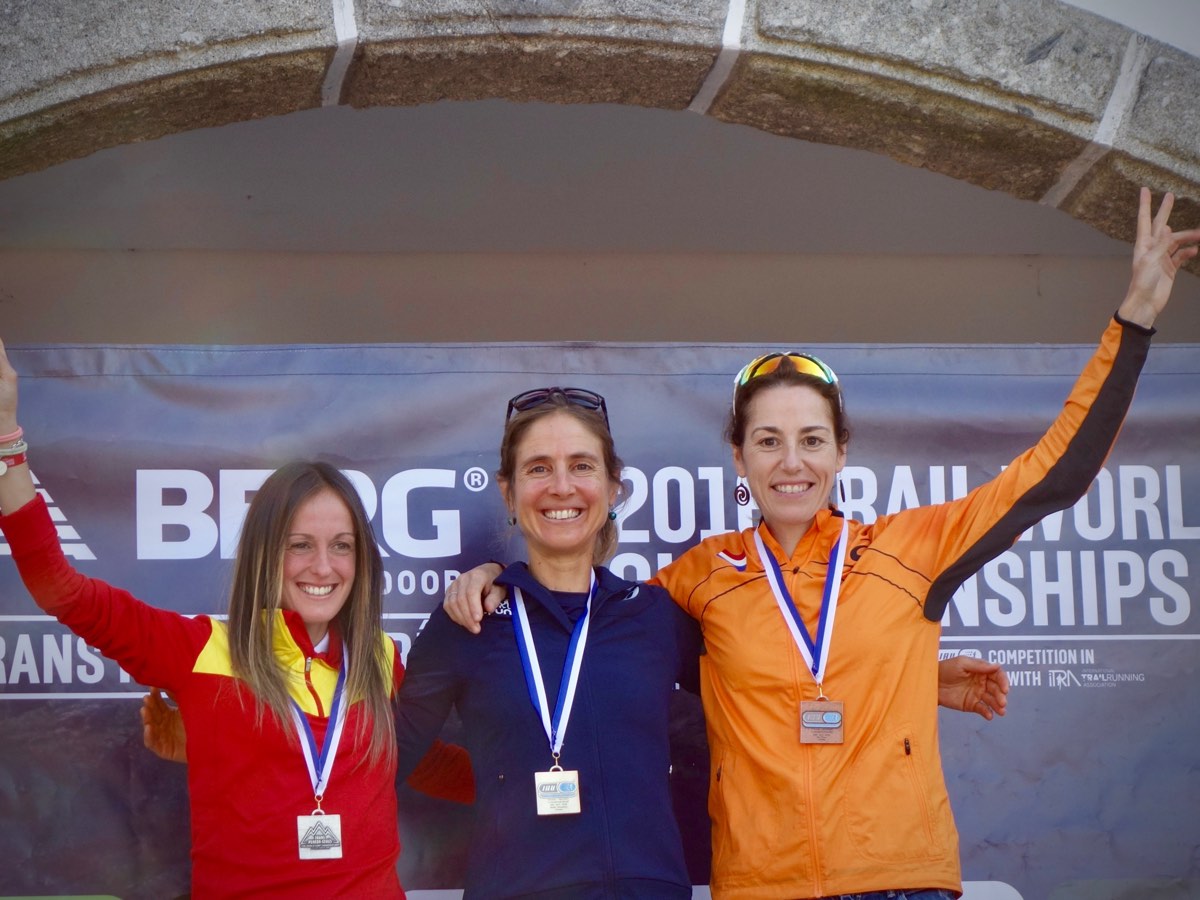
Caroline Chaverot on the podium after winning the 2016 Trail World Championships. With her is second place Azara García (left) and third place Ragna Debats. Photo: iRunFar/Meghan Hicks
During our interview, I mention that I remember seeing her at the end of that UTMB when she was struggling. “Ah yes, I remember! UTMB was always very difficult. I think my muscles weren’t strong enough. I had real problems with all the downhills from Grand Col Ferret [at around 100k into the 170k race]. It was so painful.”
Her 2016 UTMB victory was an atonement for the previous year’s UTMB DNF. “My 2015 race was a sad story. After Trient [at about 140k], the downhills became a nightmare and I couldn’t run, so I walked. And then I couldn’t even do a step forward. It was a big, big disappointment for me. Afterward for two days I had real problems walking. Coming back to win in 2016 was my best moment. I was on a cloud for two months. I wouldn’t think about the race without wanting to cry. It was one of the biggest satisfactions of my life.”
Things started to change the next year, though, with her 2017 of racing more a mixed bag of results. She either won or dropped from all of the races she started. Among her successes were victories at both the previously mentioned Lavaredo Ultra Trail and the Hardrock 100. She describes Lavaredo as “a big, big satisfaction. I was very tired at the beginning of the season, but I knew that was over and I could have good races again.”
I saw her myself during that Lavaredo, again with her trademark heavy breathing. I ask her about it, “I think I have a very good endurance, but I had never practiced athletics before, so I don’t think I have a good VO2max. At Lavaredo I ran with Ruth Croft and I was working hard but it was easy for her. After a while normally, [the breathing] gets easier, but still in every race the main problem for me was breathing. I don’t know why. But I can hold that effort for a long time.”
Also in 2017, Caroline made a lifestyle change to only work part-time. “And with my kids a little older, I had more time for training and resting–more time for me. But it was then that I got tired. I started to get more and more tired and I could never really recover.”
“Before 2016 I was not that strong in training, but fantastic in competition. After it was the opposite. In 2018 during the winter, I was feeling really good in training, fast and confident. I thought, Great, I will have a fantastic season. But I went to [the 2018] Transgrancanria and it was a nightmare. I was very slow, unable to run well. I never really understood what was wrong.”
Her drop from that race was amidst a downhill trajectory in both her performance as well as her feelings while running. Was she simply training too much? “Before 2016, I didn’t train that much and it worked for me. But then I said, ‘Okay, I want to be better. Everyone else is training a lot, so I will train like them.’ Maybe I did too much? Or maybe too soon? If training becomes like a competition, then you get tired. I probably trained too hard and fast.”
In 2018 she DNFed at UTMB for the second year in a row. “I thought, After UTMB I will rest–really rest, not run, and enjoy life. So in November [after about two months of rest,] I started to train again. I was fast and not tired. But then I suddenly broke my foot, a stress fracture. That moment was probably the end of my career. Often a stress fracture takes six weeks to mend, but mine took five months, until the end of April [of this year]. And then I made a mistake, maybe it was too early to do Lavaredo.”
She admits she hasn’t always been good at acknowledging her fatigue. “I cross trained last winter and felt a little bit of fatigue, but didn’t really want to admit it, you know? Maybe I have a problem with facing reality when I don’t like it. I think I was tired, but I said, ‘No, no, it’s fine, it’s just my foot.’ When I look at it now, I can see I wasn’t in great shape.”
She started the 2019 Lavaredo Ultra Trail after just a couple months of running on her healed foot. “The weeks before the race, I felt really great. But then I felt very tired when I warmed up before the start. It was too late to hesitate, so I took the start. After the first 5k, I was already considering dropping because my feelings where horrible. But I decided to try to continue. Then I got a huge pain in one of my leg muscles and I got more and more tired.”
It was just hours after dropping from the race that she announced on social media that she was retiring from running.
Was it a relief in some ways? “No. I’ve always enjoyed competing. I miss the adrenaline before the race. It was a very hard decision. I was very sad, but I had to accept it. Some people can’t even walk or practice sport. I am still in good health and I can have fun in the mountains. And my kids are competing, so I need time for them. I am happy to have had all these experiences, won those races, and made good friends. I feel very grateful. I would have liked to continue some years more, but I have not really the choice at the moment.”
Doctors have been unable to pinpoint her issue. “They never find anything. Sometimes it’s lack of iron, then maybe Lyme disease, but there’s never been a clear answer.”
Caroline is now a part-time teacher, at two schools, working with teenagers with learning difficulties. She still practices sports like running, biking, cross-country skiing, and hiking. Her children, now aged seven, nine, and 11, love to play in the outdoors and she eagerly joins them. She’s even written a yet-to-be-published book. “It’s nothing about running!” she laughs. Rather, the subject matter is detective fiction for teenagers. Though, “the next one will be something about running in the mountains.”
Has she ruled out a return to competitive running in the future? “I train like I am going to compete. I do some intervals, some uphill training, because I like it. But for the moment I don’t think I will be able to compete again. I run for pleasure, for fun. I need that. I need to be outside, to practice sport. It’s part of me and my life.”
This summer was the first time Caroline hadn’t been at UTMB for many years. “It was hard to watch. Every night I dreamed of UTMB. It is the race to win. I was with my family in the Pyrenees and I thought about training and competing again. But I still feel tired. I can run, no problem. I think I could run fast. But I don’t feel very rested. So for the moment I am sticking with my decision to quit competition. If one day I really feel rested and in very good shape, maybe I can do one or two runs just for fun. But for the moment, I am tired.”
